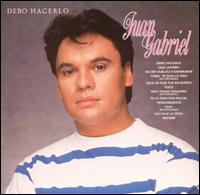Album history
Between 1986 and 1994, Mexican singer-songwriter Juan Gabriel refused to record any material because of a dispute with BMG over copyrights to his songs. He continued his career in live stage performances, setting attendance records throughout Latin America. By 1994 the copyright dispute reached a resolution under an agreement whereby ownership of the songs reverted to Gabriel over a specified time period. [2] The record label selected eleven previously released tracks from Gabriel's catalog to release "Debo Hacerlo", the last new song recorded by the artist. [1] This compilation album became a success, selling six million copies in Latin America and receiving a platinum certification in United States for shipments of 200,000 units. [3] [4]
The tracks included are: "Que Lástima", "Te lo Pido Por Favor" and "Sólo Sé Que Fué en Marzo" that were first released on the album Pensamientos . [5] "Todo" and "No Vale la Pena", taken from the album Todo. [6] "No Me Vuelvo a Enamorar" was recorded for the album Cosas de Enamorados. [7] "Bésame" was included on Recuerdos II. [8] The versions included on this release for the songs "No Tengo Dinero" (Nao Tenho Dinheiro), "Lily" (Vive) and "No Quiero" (Toma, Te Don la Vida) were recorded in Portuguese. The original versions can be found on the album El Alma Joven (1971) and El Alma Joven III (1973). [9]
This page is based on this
Wikipedia article Text is available under the
CC BY-SA 4.0 license; additional terms may apply.
Images, videos and audio are available under their respective licenses.
